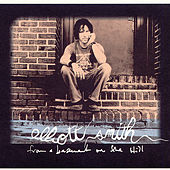Someone sometime ago pointed out my seeming fondness for “ sad and suicidal” music. That was even before she learned of Elliot Smith’s death from an apparent suicide on a sad day in October 2003. And while I may argue that my music collection is not entirely gray with sadness and that in fact it is filled with vibrant colors and rhythms , I couldn’t say I totally disagree with the comment. Aside from Elliot Smith, I’m a fan as well of Jeff Buckley, who 7 years ago drowned in the murky waters of the Mississippi river. While Buckley did not actually commit suicide (or did he?), he died, like Smith, way too early. These two songwriters were of my age. Buckley died at 30 and Smith at 34.
Why write about death on a Monday morning? Well, I read an interesting review of Smith’s last (or latest?) album called “From a Basement on the Hill” which got me wondering about my own life and the music that’s been accompanying it all these years. I realized that sadness and sweetness punctuate my soundtrack.

From a Basement on the Hill by Elliot Smith
For many fans, Elliott Smith's greatest gift to the world was his sadness. He was thirty-four when he died on October 21st, 2003, from two stab wounds to the chest. But the more we learned about his death, the less we knew. For a while, everybody (including the police) assumed it was suicide; then others started to suggest, ominously, that it wasn't, and a coroner's report, issued last December, said the evidence was inconclusive. So bereaved fans were left with nothing but their own dull grief, which came to seem like an echo of Smith's own implacable melancholy. Their sadness was his.
But sadness was never what set Smith apart from the other rumpled punky strummers. By 1994, when he started branching out from his post-punk band Heatmiser to record solo albums, the real surprise was Smith's sweetness. He was a punk who cleaned up good, who could turn an excruciating song about dope addiction into something whistle-able and Beatlesque. When he ambled onstage at the 1998 Oscars, fluorescent in an all-white suit, singing an expurgated "Miss Misery" (from the Good Will Hunting soundtrack), it somehow made sense. With songs like that, why shouldn't he have been serenading millions of listeners?
The crossover started and ended that night, and not just because he lost the Oscar to Celine Dion. His appealing 1998 album, XO, had grander production but slighter songs than 1997's marvelous Either/Or, and after 2000's Figure 8, he more or less disappeared. Now, days before the one-year anniversary of his death, comes From a Basement on the Hill, the album he was still tinkering with when he died.
It starts thick and hazy, with "Coast to Coast" slowly fading in; atop an elegant jumble of guitars, he sings, "I've got no new act to amuse you/I've got no desire to use you." Like most of the fifteen songs here, this one hints at drugs and death, wasted nights and wasted lives. This is an album about the seductions of oblivion, and a few of the more densely arranged songs mimic the characters in the lyrics, stumbling around without quite connecting.
More often, though, Smith teases extraordinary wit and warmth from songs that float lazily toward happiness. Despite the foreboding title, "Strung Out Again" is a lilting, slyly persuasive ode to a pleasure that comes and goes like the ocean: "The tide's coming in/And I'm strung out again." Then there's "Memory Lane," a bitter two-and-a-half-minute cautionary tale, sung and fingerpicked so gently that it sounds like a lark. And the woozy "Don't Go Down" begins with something resembling a joke: "I met a girl, snowball in hell/She was as hard and as cracked as the Liberty Bell."
Yes, there's plenty of sadness here. On "Pretty (Ugly Before)," Smith and his former Heatmiser bandmate Sam Coomes sing, "I felt so ugly before/I didn't know what to do." But the harmony tells a different story, and the two repeat the complaint until it sounds like a blissful affirmation.
The album's centerpiece is "A Fond Farewell," which is exactly what Smith fans need: an upbeat but ambivalent song with a contagious chorus that sticks in your head after the rest of the CD is over. When he murmurs, "This is not my life/It's just a fond farewell to a friend," you can't tell what, exactly, he's eulogizing: A bad habit? A good lover? Himself? But you can tell it will be missed.
KELEFA SANNEH(Posted Oct 28, 2004)





